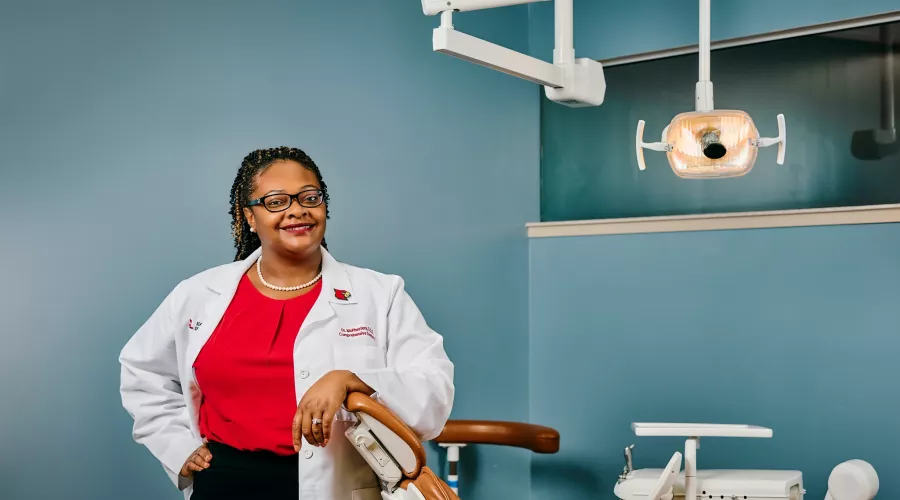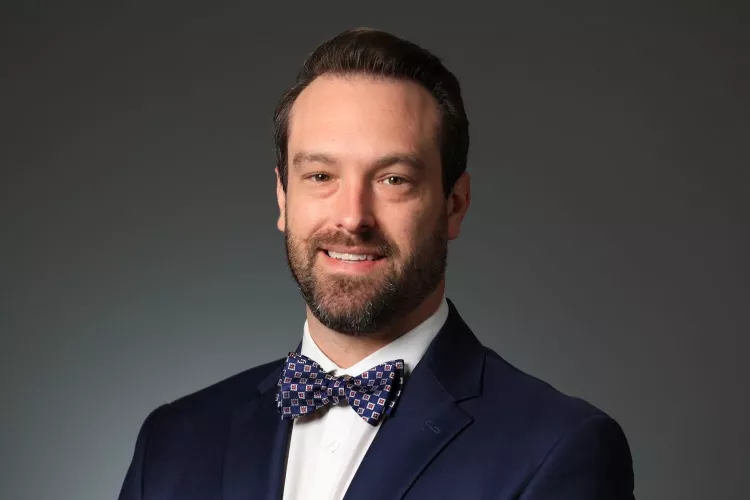Shaping the future of accessible dentistry
February 10, 2025
As a dentist, Tiffany McPheeters has taught plenty of people how to properly brush their teeth. But one particular lesson close to home led McPheeters down a new career path that is helping to change lives for practitioners and patients.
McPheeters’ son, Joshua, was born in 2018 with Trisomy 18, a genetic condition that causes severe developmental delays.
McPheeters, her husband and her mother all received medical training to learn how to care for Joshua at home, with assistance from home nurses. That’s when McPheeters found a disconnect between dental and medical care.
“I had to teach Joshua’s home nurses how to brush his teeth, which is a little bit more difficult for a patient with special needs, depending on the level of care needed. Many medical professionals aren’t taught how to brush their patients’ teeth because they have to be focused on things like ‘is their heart rate ok’ or ‘are they breathing ok’,” McPheeters said. “Joshua can't swallow, so we have to use a special suction toothbrush in order to brush his teeth and we have to use a technique where you retract his cheek to keep his mouth open so that he doesn’t bite down on your fingers.”
Now a professor at UofL’s School of Dentistry, McPheeters’ experiences caring for Joshua inspired her to shift her work from practice to academia, specializing in research and education to provide accessible and quality dental care for patients with special needs, which she says is overlooked or forgotten in most medical curricula.
“It’s shocking that it’s 2025 and there’s been nothing in place for special needs care,” she said.
Determined to discover ways she – and other dental practitioners – could treat more patients with special needs without sending them to specialists, McPheeters volunteered at the Lee Specialty Clinic, a Louisville medical clinic that specializes in providing care for those with intellectual and developmental disabilities. While there, she saw what she described as “true accessible care.”
“I volunteered there so I could learn how to keep some of my patients in house and I saw what techniques they use, like weighted blankets, special equipment for x-rays, special devices to prevent tongue thrusting and biting … they don’t just have wheelchair accessible front doors, but wheelchair accessible machines and equipment so that once they get through the door, patients can actually get the care they need,” McPheeters said. “They have occupational therapists and many different doctors there. We need more clinics like this.”
Realizing the need for special equipment and education on caring for those with disabilities, McPheeters applied for and was chosen to participate in the Primary Interdisciplinary Care Educators Fellowship through the U.S. Department of Health and Human Services’ Health Resources and Services Administration and University of Rochester. Throughout the two-year career development program, McPheeters will hone her research skills and learn the best ways to secure grants that will help turn her ideas into action.
Creating and implementing special needs dental care curriculum is critical to helping people, she said. She previously received UofL’s Gheens Community Engagement Mini Grant to create curriculum that gives home care providers oral care training for homebound patients. The grant also allowed her to provide dental supplies for the community.
Through her outreach, and sharing Joshua’s story at educational presentations, McPheeters has received phone calls, emails and heard from people across the community who have shared their own stories and relate to the gap in special needs care.
Pushing the needle forward, McPheeters aims to secure more grants to expand curriculum and provide dental students with the experience, exposure and skills needed to provide care for everyone.
McPheeters’ research and Joshua’s story are spreading awareness for special needs care across the Cardinal community. For example, a student at the dental school was inspired to launch the UofL Special Care Dentistry Association registered student organization to help increase awareness of the field among students after he read an article about Joshua.
“It started out as a sad story and now it’s turned into a testimony,” McPheeters said. “The more I tell Joshua’s story, the more I connect with others in the special needs community who also have incredible stories telling me about their needs for better access to care. I want to be an advocate and I may not be able to get it all done, but I want to get something done and make a difference.”
There is no cure for Trisomy 18 and most children born with the condition are not expected to live more than one year. Joshua, however, continues to defy expectations.
With her son as her inspiration and knowing her research and teachings will continue to grow with the dental students and practitioners of tomorrow, the hard work is worthwhile for McPheeters. She continues to lead with intention, determination and infectious optimism.
“To know that we’ll have the curriculum and tools to care for people like my son … I’m just overcome with emotion,” McPheeters said. “We are going to do the best that we can to give people the best possible care. And it’s so rewarding.”
Caitlin Brooks is a communications and marketing coordinator in the Office of Communications and Marketing. Brooks joined OCM after earning her Bachelor of Science and Master of Art degrees in Communication from UofL. Brooks previously worked as a graduate assistant and public speaking instructor at UofL and is an avid Broadway and Disney fan.
Related News



